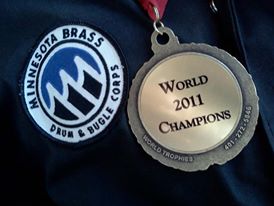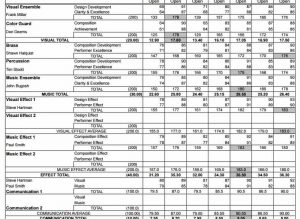So we haven’t made much time to talk about competition this year, and I wanted to share some thoughts and some details with you all as we head into the final two weeks of the competitive season. This is particularly important for those of you who are new to Minnesota Brass and the DCA World Championships.
Before getting into the specifics, let me take just a moment to remind you that competition in art is inherently ridiculous. Measuring the effect that music has? Measuring how well the audience is entertained? Measuring who’s flags have a greater impact on communicating an emotion in the show? Please. We compete because it helps us to get better and because it inspires us to reach new levels of excellence. We compete because it’s fun for our audience and for us as performers and designers. But the value of your art, the impact of your performance and the reasons you do this, are not at all well represented by a single number.
 Having said that, we participate in an activity that is devoted to trying to measure just such nonsense. No doubt by now you’ve seen the ‘rankings’ of corps floating around that show everyone’s most recent score from highest to lowest. The good (and I’d say accurate) thing about these these rankings is they show three corps bunched together at the top of the competitive landscape–the Buccaneers, Caballeros and us. Each of these corps scored within a point of one another on Saturday. This is exciting and cool and is probably an indication that these three corps are all contenders for winning a championship in two weeks. You should feel proud that your work has once again resulted in Minnesota Brass being among the very best corps in our activity.
Having said that, we participate in an activity that is devoted to trying to measure just such nonsense. No doubt by now you’ve seen the ‘rankings’ of corps floating around that show everyone’s most recent score from highest to lowest. The good (and I’d say accurate) thing about these these rankings is they show three corps bunched together at the top of the competitive landscape–the Buccaneers, Caballeros and us. Each of these corps scored within a point of one another on Saturday. This is exciting and cool and is probably an indication that these three corps are all contenders for winning a championship in two weeks. You should feel proud that your work has once again resulted in Minnesota Brass being among the very best corps in our activity.
Next weekend, most of the corps on the East Coast will compete again. They will get another score which will almost certainly be higher than the number they currently have. It’s possible that another corps (Cadets2) could receive a score higher than the score you earned on Saturday. These final scores will then be used to determine the performance order for semi-finals at DCA. What history has taught me is that, regardless of what the scores are next weekend, many of our members will feel frustrated and disappointed that our peers have an opportunity to achieve a higher score that we don’t have. Many will say the system is unfair and the competitive field is uneven.
To a certain extent, I agree with that. We *do* have a steeper hill to climb; our competitors do have an opportunity we don’t have. So what? Whether you are seeded 3rd or 4th on Saturday night should not impact your ability to perform. What the Bucs score or the Cabs score or C2 scores next week has no bearing on the scale you should be using to measure your performance. Being better than the Bucs is not much of a goal; being balls to awesome great is a pretty good one.
While we spend a lot of energy thinking about the performance order for semi-finals, I’m not convinced it matters much. You should know that at the semi-finals performance, the judges “hold” their scores. What does that mean? Without getting too technical, judges have two jobs–they have to RATE how well you perform and RANK how well  each group does relative to other groups. Back in the day, judges turned in the scores for each corps immediately after that corps’ performance. This meant that for tight competitions, the earlier corps were often at a disadvantage. A judge might hear the best drum line in the middle of the performance order, but it would be hard to give them a huge score because the judge would want to leave room just in case a later drumline sounded even better and earned a higher number. Well, at DCA they don’t do that. The judges put their scores down and “hold” the sheets until each corps is done competing. This allows them not only to RATE our performance (immediately after we perform) but to double check and make sure they are accurate in their RANKING of each corps performance (after they’ve seen everyone). So, in theory, if that kick ass drumline that performed early in the night was still the best drumline at the end of the night, the judge can make sure their numbers reflect that.
each group does relative to other groups. Back in the day, judges turned in the scores for each corps immediately after that corps’ performance. This meant that for tight competitions, the earlier corps were often at a disadvantage. A judge might hear the best drum line in the middle of the performance order, but it would be hard to give them a huge score because the judge would want to leave room just in case a later drumline sounded even better and earned a higher number. Well, at DCA they don’t do that. The judges put their scores down and “hold” the sheets until each corps is done competing. This allows them not only to RATE our performance (immediately after we perform) but to double check and make sure they are accurate in their RANKING of each corps performance (after they’ve seen everyone). So, in theory, if that kick ass drumline that performed early in the night was still the best drumline at the end of the night, the judge can make sure their numbers reflect that.
If you think this corps can win a World Championship (and you should think that), than the only thing we have control over is us. How much we practice outside of rehearsal, how effective we are at rehearsal together and how we perform in Rochester.
Some in our organization still insist that “they” (the judges and administrators who run DCA) won’t let us win a championship or are biased against Minnesota Brass. There was certainly a time this was true. But today, in 2015, I don’t believe that for a second. We’ve won a championship. We’ve won multiple caption awards. We’ve heard from judges who tell us we are very much in the mix of top tier corps. Sure, our path is a little tougher than the other guys. Who cares? It’s not judges that determine our performance in Rochester. It’s us.



Eric: You have gained a lot of wisdom in your few years in the role of corps director. During my 25 years of learning the DCA system and The DCI system, I agree COMPLETELY with your assessment. We started on the road to excellence 69 years ago . . . but turned on the gas 20 years ago by tightening our standards for being a marching member or instructor of the corps, by tightening our requirements for attendance at rehearsals, on decorum both on the field and on the practice field.. It has worked to make huge steps on the Road to Excellence.
Thanks also to our leaders like Gavin Burnham, Joel Matuzak, and recent corps directors who have become influential leaders in the DCA association by promoting rule changes that make sense and make the performance standards, the fairness rules and the judging rules better.
I am so proud of this organization and the distances we have covered during my tenure on the board for 24 years.
Love this perspective from the corps. I am so proud of this organization.
Let me add this to the discourse from Jon Gordon:
There is a difference between success and excellence.
Success is often measured by comparison to others. Excellence, on the other hand, is all about being the best we can be and maximizing our gifts, talents and abilities to perform at our highest potential.
We live in a world that loves to focus on success and loves to compare. We are all guilty of doing this. However, I believe that to be our best we must focus more on excellence and less on success. We must focus on being the best we can be and realize that our greatest competition is not someone else but ourselves.
For example, coaching legend John Wooden often wouldn’t tell his players who they were playing each game. He felt that knowing the competition was irrelevant. He believed that if his team played to the best of their ability they would be happy with the outcome. In fact, John Wooden never focused on winning. He had his team focus on teamwork, mastering the fundamentals, daily improvement and the process that excellence requires. As a result he and his teams won A LOT.
A focus on excellence was also the key for golfing legend Jack Nicklaus. His secret was to play the course not the competition. He simply focused on playing the best he could play against the course he was playing. While others were competing against Jack, he was competing against the course and himself.
The same can be said for Apple’s approach with the iPod, iPhone and iPad. When they created these products they didn’t focus on the competition. Instead they focused on creating the best product they could create. As a result, rather than measuring themselves against others they have become the measuring stick.
We have a choice as individuals, organizations and teams. We can focus on success and spend our life looking around to see how our competition is doing, or we can look straight ahead towards the vision of greatness we have for ourselves and our teams. We can look at competition as the standard or as an indicator of our progress towards our own standards. We can chase success or we can embark on a quest for excellence and focus 100% of our energy to become our best… and let success find us.
Ironically, when our goal is excellence the outcome and byproduct is often success.
-Jon Gordon